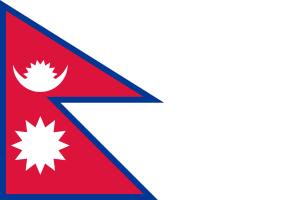Language/Nepali-individual-language/Vocabulary/Common-Nepali-Words-and-Phrases
| ◀️ Greetings and Introductions — Previous Lesson | Next Lesson — Food in Nepali ▶️ |
Introduction[edit | edit source]
Welcome to the lesson on Common Nepali Words and Phrases! In this lesson, we will explore some of the most frequently used words and phrases in the Nepali language. These words and phrases are essential for everyday conversation and will help you communicate effectively with native Nepali speakers. By the end of this lesson, you will have a solid foundation of vocabulary to confidently engage in basic conversations in Nepali. So let's get started!
Greetings and Introductions[edit | edit source]
One of the first things you need to learn when studying any language is how to greet people and introduce yourself. In Nepali culture, greetings play an important role in establishing connections and showing respect. Here are some common greetings and introductions in Nepali:
Good Morning[edit | edit source]
In Nepali: "शुभ प्रभात" (shubha prabhat)
Good Afternoon[edit | edit source]
In Nepali: "शुभ दिउसो" (shubha diuso)
Good Evening[edit | edit source]
In Nepali: "शुभ सांझ" (shubha saanjh)
Good Night[edit | edit source]
In Nepali: "शुभ रात्री" (shubha raatri)
Hello[edit | edit source]
In Nepali: "नमस्ते" (namaste)
How are you?[edit | edit source]
In Nepali: "तपाईंलाई कस्तो छ?" (tapailai kasto chha?)
I'm fine, thank you[edit | edit source]
In Nepali: "मलाई सानो छ, धन्यवाद" (malai sano chha, dhanyavaad)
What is your name?[edit | edit source]
In Nepali: "तपाईंको नाम के हो?" (tapainko naam ke ho?)
My name is...[edit | edit source]
In Nepali: "मेरो नाम ..." (mero naam ...)
Nice to meet you[edit | edit source]
In Nepali: "तपाईंलाई भेटेर खुसी लाग्यो" (tapailai bhetera khushi laagyo)
Now, let's practice these greetings and introductions with some interactive exercises.
Exercises[edit | edit source]
1. Translate the following phrases from English to Nepali:
- Good Morning
- Thank you
- What is your name?
- I'm sorry
- How are you?
Solution:
- शुभ प्रभात
- धन्यवाद
- तपाईंको नाम के हो?
- माफ गर्नुहोला
- कस्तो छ तपाईंलाई?
2. Write a dialogue using the greetings and introductions you have learned.
Solution: Person A: नमस्ते! (Hello!) Person B: नमस्ते! तपाईंलाई कस्तो छ? (Hello! How are you?) Person A: मलाई सानो छ, धन्यवाद। तपाईंलाई कस्तो छ? (I'm fine, thank you. How about you?) Person B: मलाई पनि सानो छ, धन्यवाद। (I'm also fine, thank you.) Person A: तपाईंको नाम के हो? (What is your name?) Person B: मेरो नाम राज हो। तपाईंको नाम के हो? (My name is Raj. What is your name?) Person A: मेरो नाम सिता हो। तपाईंलाई भेटेर खुसी लाग्यो। (My name is Sita. Nice to meet you.) Person B: तपाईंलाई पनि भेटेर खुसी लाग्यो। (Nice to meet you too.)
Cultural Insight[edit | edit source]
Nepal is known for its rich cultural heritage and diverse traditions. The Nepali language is deeply intertwined with the country's culture, and learning common words and phrases can help you navigate social interactions and appreciate the local customs. In Nepali culture, it is common to greet others with a warm smile and a slight bow, while saying "namaste." This gesture signifies respect and acknowledgement of the other person's presence. Additionally, Nepali people often use honorifics when addressing someone older or in a position of authority, such as "dai" (brother) or "didi" (sister). These small cultural nuances can make a big difference in building connections with the local community.
Conclusion[edit | edit source]
Congratulations! You have completed the lesson on Common Nepali Words and Phrases. By mastering these words and phrases, you are well on your way to becoming a confident communicator in Nepali. Practice using these greetings and introductions in everyday conversations to enhance your language skills. In the next lesson, we will explore the topic of food and drinks in Nepali. Keep up the great work!
Other Lessons[edit | edit source]
- Resources
- Count to 10
- Languages bhashaharu भाषाहरू
- Geography
- Days of the Week
- Greetings and Introductions
- Food in Nepali
- Fruits
- Clothes
- Drinks in Nepali
| ◀️ Greetings and Introductions — Previous Lesson | Next Lesson — Food in Nepali ▶️ |

